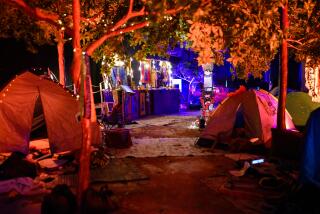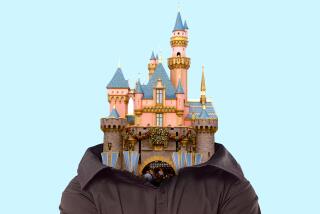Disney Exhibit Turning Out to Be Capital Offense
- Share via
JERUSALEM — The bitter conflict over this holy city has spilled into the place that is supposed to be the happiest on Earth. And nobody’s smiling about it.
More than a year ago, officials of the Walt Disney Co. invited Israel and 23 other nations to take part in a special millennial celebration at Walt Disney World’s Epcot Center in Orlando, Fla. The aim, a Disney spokesman said, was to showcase cultural diversity, not political differences.
But to its chagrin, the entertainment giant has found itself knee-deep in one of the world’s stickiest, most political controversies: the competing claims of Israel and the Palestinians to Jerusalem.
“We are not taking sides on this issue,” a Disney spokesman said Wednesday, choosing his words with care. “We are in the business of entertainment, trying to provide a good experience for our guests.”
The problem, Arab and Muslim groups say, is that the Israeli exhibit planned for Epcot’s Millennium Village, which is set to open Oct. 1, depicts Jerusalem as Israel’s capital. And that, in their view, means the entertainment company is taking a side--Israel’s--in the yet-to-be-resolved dispute over the city.
Some have called for a boycott of Disney theme parks and products if the exhibit is not changed.
Alarmed by the controversy, Disney has invited Arab and Muslim representatives to a meeting soon to “try to reach a point of understanding,” said Bill Warren, director of public affairs for the Walt Disney World Resort, which includes Epcot.
Warren would not specify whether the Israeli exhibit--which includes a film on the country’s religious history and a simulated ride called “Journey to Jerusalem”--explicitly shows the city as Israel’s capital. Nor would he say whether the exhibit had been changed because of the burgeoning dispute.
“Every exhibit is evolving and changing in these last few weeks before the village opens,” he said. “But we can’t comment on anything specifically.”
Israeli officials also declined to comment on whether the three-part, $8-million display at Epcot describes Jerusalem as the capital of the Jewish state. They insisted Wednesday that the exhibit was never intended to be political, although a media packet offered at a news conference last month noted that Israel and Disney had agreed that the display would “give expression to the centrality” of Jerusalem as Israel’s capital.
In a letter sent to Disney Chairman Michael D. Eisner on Monday, Eitan Bentsur, director general of Israel’s Foreign Ministry, urged the company to present the exhibit “in its entirety” and not to “surrender to political pressure . . . against any country whatsoever.”
Arab American and Jewish American groups, meanwhile, are weighing in from their respective sides, on the one hand calling for a boycott and on the other urging Disney not to “cave in” to Arab pressure.
But unfortunately for Disney, the timing of this latest flare-up in the long-running struggle over the city is not a coincidence.
As the once-moribund peace process moved forward this week with the opening of Israeli-Palestinian talks aimed at finding a permanent solution to the conflict, both sides are focused intensely on the difficult issues that still divide them.
Of those, the most emotional is Jerusalem. Israel captured Jerusalem’s eastern half in the 1967 Six-Day War and claims the entire city as its “eternal, undivided” capital, although the United States and most nations have never recognized it as such and keep their embassies in Tel Aviv. The Palestinians want the eastern sector for themselves, as the capital of a future state.
Underlining the difficulties, a poll published Wednesday showed that an overwhelming 93% of Palestinians would oppose any permanent peace deal that made Jerusalem the capital of Israel, even if that were the only issue preventing an overall accord.
In addition, nearly half of those included in the Aug. 26-27 survey by the Jerusalem Media and Communications Center said they wanted both sides of the city as the unified capital of a future Palestinian state.
Israel also has been staking its claim to the city assertively this week.
On Wednesday night, at a reception honoring Central American nations, Prime Minister Ehud Barak seized the opportunity to refer to the city as Israel’s “eternal and indivisible capital” and to praise the two governments--El Salvador and Costa Rica--that have moved their embassies here.
Back at Disney World, a near-target this week of Hurricane Floyd, officials were still struggling to cope with the storm blowing in from the turbulent Middle East.
“This still is the happiest place on Earth,” Warren said, sounding determined. “We certainly didn’t start this debate. We just got swept up in it.”
More to Read
The biggest entertainment stories
Get our big stories about Hollywood, film, television, music, arts, culture and more right in your inbox as soon as they publish.
You may occasionally receive promotional content from the Los Angeles Times.










